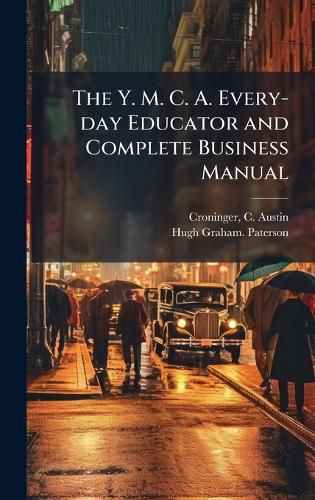Readings Newsletter
Become a Readings Member to make your shopping experience even easier.
Sign in or sign up for free!
You’re not far away from qualifying for FREE standard shipping within Australia
You’ve qualified for FREE standard shipping within Australia
The cart is loading…






"The Y. M. C. A. Every-day Educator and Complete Business Manual", published in 1907, is a comprehensive guide to self-improvement and business acumen. Authored by C. Austin Croninger and Hugh Graham Paterson, this manual reflects the YMCA's commitment to providing practical education and moral guidance to young people entering the workforce.
The book covers a wide range of topics, including business etiquette, communication skills, financial management, and personal development. It offers advice and instruction designed to equip readers with the knowledge and abilities necessary to succeed in various professional endeavors. This vintage manual provides a fascinating glimpse into the educational resources available at the turn of the 20th century, offering valuable insights into the values and skills that were considered essential for success.
This work has been selected by scholars as being culturally important, and is part of the knowledge base of civilization as we know it. This work was reproduced from the original artifact, and remains as true to the original work as possible. Therefore, you will see the original copyright references, library stamps (as most of these works have been housed in our most important libraries around the world), and other notations in the work.
This work is in the public domain in the United States of America, and possibly other nations. Within the United States, you may freely copy and distribute this work, as no entity (individual or corporate) has a copyright on the body of the work.
As a reproduction of a historical artifact, this work may contain missing or blurred pages, poor pictures, errant marks, etc. Scholars believe, and we concur, that this work is important enough to be preserved, reproduced, and made generally available to the public. We appreciate your support of the preservation process, and thank you for being an important part of keeping this knowledge alive and relevant.
$9.00 standard shipping within Australia
FREE standard shipping within Australia for orders over $100.00
Express & International shipping calculated at checkout
"The Y. M. C. A. Every-day Educator and Complete Business Manual", published in 1907, is a comprehensive guide to self-improvement and business acumen. Authored by C. Austin Croninger and Hugh Graham Paterson, this manual reflects the YMCA's commitment to providing practical education and moral guidance to young people entering the workforce.
The book covers a wide range of topics, including business etiquette, communication skills, financial management, and personal development. It offers advice and instruction designed to equip readers with the knowledge and abilities necessary to succeed in various professional endeavors. This vintage manual provides a fascinating glimpse into the educational resources available at the turn of the 20th century, offering valuable insights into the values and skills that were considered essential for success.
This work has been selected by scholars as being culturally important, and is part of the knowledge base of civilization as we know it. This work was reproduced from the original artifact, and remains as true to the original work as possible. Therefore, you will see the original copyright references, library stamps (as most of these works have been housed in our most important libraries around the world), and other notations in the work.
This work is in the public domain in the United States of America, and possibly other nations. Within the United States, you may freely copy and distribute this work, as no entity (individual or corporate) has a copyright on the body of the work.
As a reproduction of a historical artifact, this work may contain missing or blurred pages, poor pictures, errant marks, etc. Scholars believe, and we concur, that this work is important enough to be preserved, reproduced, and made generally available to the public. We appreciate your support of the preservation process, and thank you for being an important part of keeping this knowledge alive and relevant.